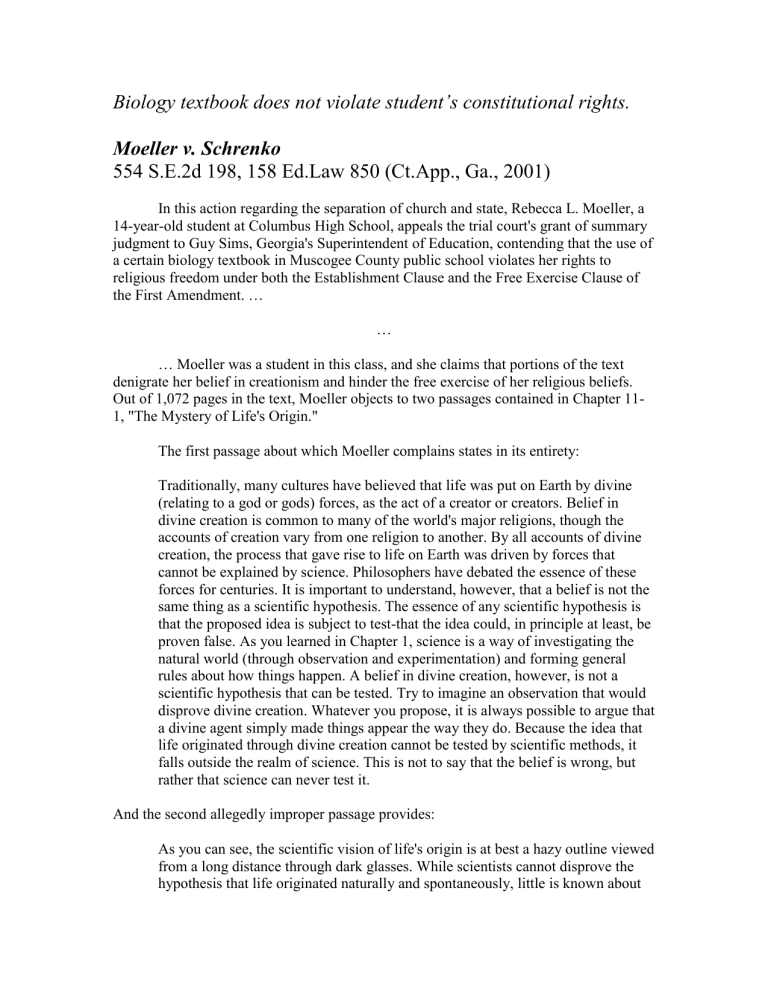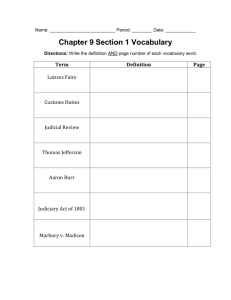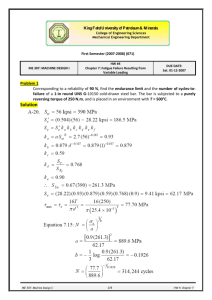Biology textbook does not violate student`s constitutional rights

Biology textbook does not violate student’s constitutional rights.
Moeller v. Schrenko
554 S.E.2d 198, 158 Ed.Law 850 (Ct.App., Ga., 2001)
In this action regarding the separation of church and state, Rebecca L. Moeller, a
14-year-old student at Columbus High School, appeals the trial court's grant of summary judgment to Guy Sims, Georgia's Superintendent of Education, contending that the use of a certain biology textbook in Muscogee County public school violates her rights to religious freedom under both the Establishment Clause and the Free Exercise Clause of the First Amendment. …
…
… Moeller was a student in this class, and she claims that portions of the text denigrate her belief in creationism and hinder the free exercise of her religious beliefs.
Out of 1,072 pages in the text, Moeller objects to two passages contained in Chapter 11-
1, "The Mystery of Life's Origin."
The first passage about which Moeller complains states in its entirety:
Traditionally, many cultures have believed that life was put on Earth by divine
(relating to a god or gods) forces, as the act of a creator or creators. Belief in divine creation is common to many of the world's major religions, though the accounts of creation vary from one religion to another. By all accounts of divine creation, the process that gave rise to life on Earth was driven by forces that cannot be explained by science. Philosophers have debated the essence of these forces for centuries. It is important to understand, however, that a belief is not the same thing as a scientific hypothesis. The essence of any scientific hypothesis is that the proposed idea is subject to test-that the idea could, in principle at least, be proven false. As you learned in Chapter 1, science is a way of investigating the natural world (through observation and experimentation) and forming general rules about how things happen. A belief in divine creation, however, is not a scientific hypothesis that can be tested. Try to imagine an observation that would disprove divine creation. Whatever you propose, it is always possible to argue that a divine agent simply made things appear the way they do. Because the idea that life originated through divine creation cannot be tested by scientific methods, it falls outside the realm of science. This is not to say that the belief is wrong, but rather that science can never test it.
And the second allegedly improper passage provides:
As you can see, the scientific vision of life's origin is at best a hazy outline viewed from a long distance through dark glasses. While scientists cannot disprove the hypothesis that life originated naturally and spontaneously, little is known about
what actually happened. Many different scenarios-some of them quite imaginative-seem possible, and some have solid support from experiments. But because researchers do not yet understand how DNA, RNA, and hereditary mechanisms first developed, science is currently unable to resolve disputes concerning the origin of life. How life might have originated naturally and spontaneously remains a subject of intense interest, research, and discussion among scientists.
Because Moeller found these paragraphs offensive, she filed suit against Sims, requesting a declaratory judgment that the textbook's content violated the First
Amendment and asking for an injunction against the textbook's use. …
Moeller contends that references in the textbook to creationism violate the
Establishment Clause of the First Amendment. …
The Establishment Clause mandates that "Congress shall make no law respecting an establishment of religion," and it was intended to prevent "sponsorship, financial support, and active involvement of the sovereign in religious activity." (Punctuation omitted.) Lemon v. Kurtzman
. … In general, the Establishment Clause ensures that the
State neither endorses nor denounces religious beliefs.
…
Alleged violations of Establishment Clause prohibitions are analyzed using the three-part Lemon test which indicates that a state action affecting a religious belief or practice will be constitutional if the state action: (1) has a secular purpose; (2) has a primary effect that neither advances nor inhibits religion; and (3) does not foster excessive state entanglement with religion. …
One does not even reach the Lemon test, however, if no establishment of religion is supported by the facts. That is the case here. The textbook criticized by Moeller does not sponsor religious actions or beliefs. To the contrary, it points out that the origin of life is, to date, unknown, and it lists the most prevalent ideas regarding this issue, including creationism and evolution. Indeed, the subchapter containing the offending passages is titled "The Mystery of Life's Origin." (Emphasis supplied.) The textbook makes it clear that no definitive answer exists with regard to the origin of life on Earth, and it lists creationism and evolution as two commonly cited explanations. …
…
And, contrary to Moeller's arguments, the textbook, on its face, indicates that it does not pass judgment on the efficacy of creation theory. It merely states that creationism is not a scientific theorem capable of being proven or disproven through scientific methods. The textbook explicitly points out, however, that just because creationism may not be subject to scientific proof, it may nonetheless be the proper explanation for the origin of life. Although Moeller may find the textbook's neutral statements on this matter offensive, the implicated passages do not comprise an
inappropriate establishment of religion. See, e. g., Fleischfresser v. Directors of School
Dist. 200
. …
…
Moreover, even if we were to find that Moeller made a viable claim of establishment, Muscogee County's use of the textbook in question would remain constitutional. Applying the Lemon test, the use of the textbook in question serves the secular purpose of educating biology students regarding both the nature of the scientific method as well as the most common explanations for the origin of life. To find that the use of the textbook has no secular purpose, as Moeller contends, we would have to conclude that its use was "motivated wholly by religious considerations." Lynch v.
Donnelly . … That is clearly not the case here.
…
With regard to the second prong of the Lemon test, a state action may be considered impermissible if its primary effect is to advance or prohibit religion. Id . at
681, 104 S.Ct. 1355. As an initial matter, the material considered by Moeller comprises only a few pages of a 1,072 page textbook, the purpose of which is to give students a broad knowledge of biology. As discussed above, the only religious references which are made inform the students that creationism is one commonly given explanation for the origin of life. This reference in no way advances or endorses a religious belief or practice, and, as such, use of the textbook does not violate the second prong of the Lemon test.
Finally, use of the textbook does not foster excessive state entanglement with religion.
School boards have broad discretion in determining curricula in their schools.
Surely, the mere exercise of this discretion cannot constitute excessive entanglement with religion. Further, there is no allegation that the publisher of the reading series is a religious organization or that the directors are in some way dealing with a particular religious organization. Nothing, then, supports a claim that the use of this reading series constitutes excessive entanglement with religion.
Fleischfresser , supra at 689.
Moeller also contends that use of the textbook in question hindered the free exercise of her religion. Again, we disagree.
"The free exercise inquiry asks whether government has placed a substantial burden on the observation of a central religious belief or practice and, if so, whether a compelling governmental interest justifies the burden." Hernandez v. Commissioner
. …
To prove a violation of the free exercise clause, Moeller must show that use of the textbook prevents her from practicing her religion. In this case, this showing has not been made, and no substantial burden has been placed on Moeller's free exercise of religion.
The use of the textbook in question in no way forces Moeller to refrain from practicing
her religious beliefs. And it does not impinge on her parents' religious instruction of their daughter. As such, Moeller's free exercise of her religion has not been substantially burdened, and use of the textbook does not violate her First Amendment rights.






